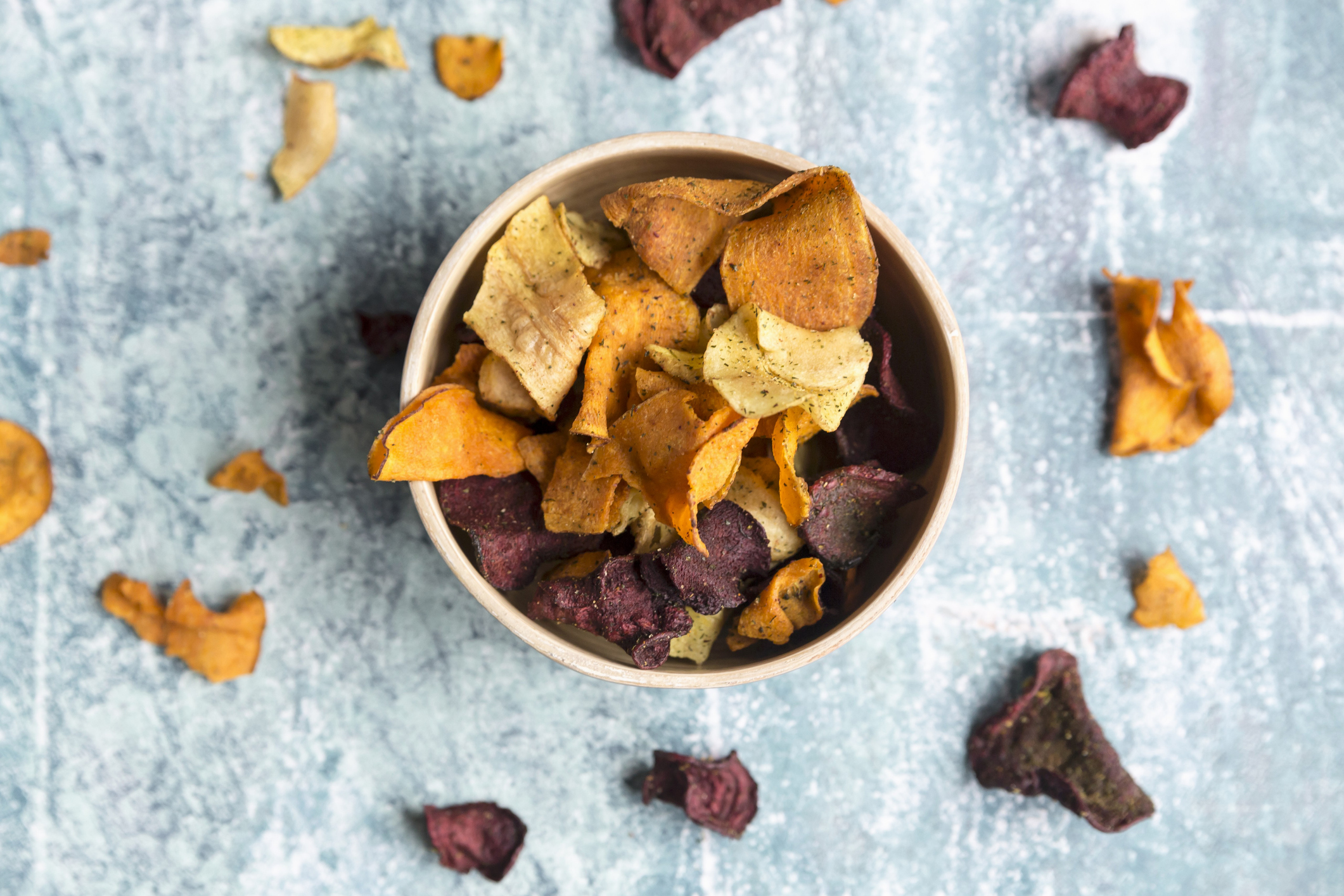
If you’re trying to sneak more vegetables into your—or your kid’s—diet, swapping regular potato chips for veggie chips or sticks may seem like a healthy substitution. But nutrition experts say some of these ostensibly good-for-you snacks are just junk food in disguise.
“Those veggie sticks are super popular at my six-year-old’s kindergarten, but they’re really no better than potato chips,” says Liz Weinandy, a staff dietitian at the Ohio State University Medical Center. “They have very small amounts of spinach or tomato paste, but they’re still a deep-fried food, and they’re not going to contribute to your daily vegetable intake in a way that supports overall health.”
Some brands of veggie snacks are actually made primarily from ground-up potato. “Often veggie chips and straws contain potato starch [or] potato flour as their primary ingredients, and you may see powdered spinach, for example, towards the end of the ingredient list—meaning many of these veggie chips are really quite similar to potato chips,” says Caroline Meehan, a registered dietitian and nutritionist at the University of Maryland Medical Center.
Veggie chips benefit from what researchers call the “health halo effect,” because, at a glance, they may seem nutritious because of the way they’re packaged or promoted. But that aura of health is an illusion, Weinandy says.
One example: the packagings of some veggie straw products depict photos of whole vegetables and trumpet the straws’ lack of preservatives and artificial flavors. While cutting these additives is a good thing, many traditional potato chips and other unhealthy snack foods can make similar claims. And all these visual and textual cues, coupled with the word “veggie,” can hoodwink consumers into thinking veggie chips and straws are healthy. But they’re not, Weinandy says.
“We know that deep fat frying can promote low-grade inflammation,” she explains. Research has also linked consuming acrylamide—an organic compound that forms when potatoes and some other starchy foods are fried—to an elevated risk for heart disease and mortality. (Some “baked” veggie snacks may not be fried in oil, but those are uncommon.)
But while veggie chips and straws aren’t healthy, those made with actual vegetables (and not potato starch) may still be an upgrade over old-school chips.
Brands like Terra produce varieties of chip made with parsnips, sweet potatoes, and other non-white-potato vegetables. “I still would not make the argument that this is a healthy food,” says Dana Hunnes, a dietitian and adjunct assistant professor at the UCLA Fielding School of Public Health. “The real healthfulness would come from eating the actual vegetable or root in a more natural form, such as boiling, sautéing, or baking.”
But for someone who’s going to eat fried chips one way or the other, skipping regular potato chips in favor of products like the Terra chips could provide a bit more fiber and a little less sodium, she says.
“Look for vegetable chips that have the vegetable product as the first or second ingredient on the list,” Meehan advises. She also recommends shopping for a snack that has fewer than 200 mgs of sodium per serving and at least a few grams of fiber.
Weinandy understands that some people don’t like vegetables, or that trying to get kids to eat vegetables can be a chore. For these folks, she recommends blending leafy greens into smoothies or adding chopped vegetables to pancake batter or casseroles. These are creative, tasty ways to inject more of these healthy foods into your diet, she says. Veggie chips are not the answer. “They may have a little more nutrition,” she says, “but the negatives still outweigh the positives.”
More Must-Reads from TIME
- Cybersecurity Experts Are Sounding the Alarm on DOGE
- Meet the 2025 Women of the Year
- The Harsh Truth About Disability Inclusion
- Why Do More Young Adults Have Cancer?
- Colman Domingo Leads With Radical Love
- How to Get Better at Doing Things Alone
- Michelle Zauner Stares Down the Darkness
Contact us at letters@time.com